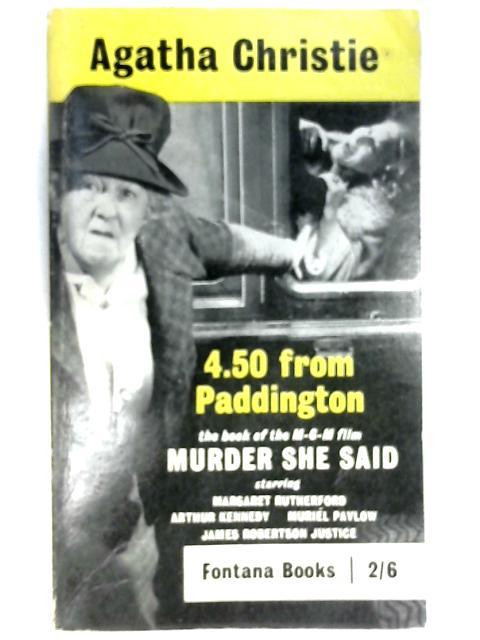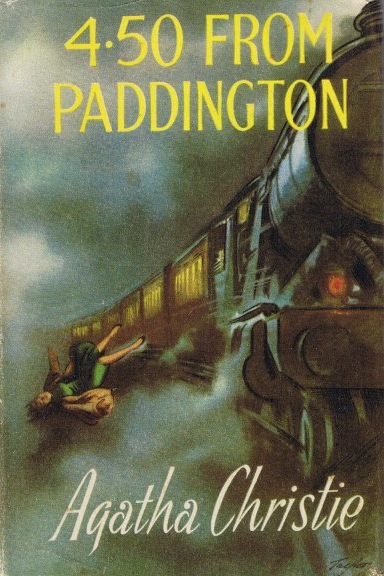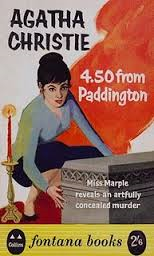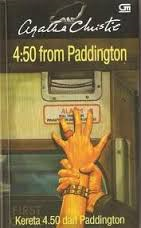Vintage Mystery Scavenger Hunt Item: Doctor (Back Cover)

This is my first re-read of my blog and is my entry into Past Offences’ Crimes of the Century Monthly Challenge. This is also a Miss Marple adventure I have a soft spot for. It begins with Elspeth McGillicuddy witnessing a man strangle a woman on a moving train which is opposite to her own. Being disbelieving by the ticket collector she tells her old friend Miss Marple about it. But with no body being found by the police it seems like Miss Marple will have her work cut trying to prove her friend’s story. Her first lead is an old house near the railway line, Rutherford Hall, which is owned by Luther Crackenthorpe. Miss Marple sends an ally, Lucy Eyelesbarrow, into the house to work as domestic help, whilst she herself goes to stay nearby at the home of a former maidservant.
Luther Crackenthorpe is an elderly invalid who lives with his unmarried daughter Emma. He also has three living sons (another, Edmund died during WW2 and he also had another daughter named Edith who died 5 years ago). Cedric is a painter abroad, whilst Alfred is the black sheep of the family always involved in shady deals and Harold is a city financier, married to an earl’s daughter. Edith’s son Alexander and his father Bryan Eastley also stay at the Hall from time to time. After a few surreptitious walks, Lucy eventually achieves the goal Miss Marple gave her: to find the body, eerily though fittingly hidden in a sarcophagus (in a barn) Luther had sent home from European travels in his youth. At first the family say they do not recognise the woman who is found, but a few tell-tale signs suggest at least Emma knows something or thinks she does. Eventually she reveals to DI Craddock from Scotland Yard (an old friend of Miss Marple’s) a piece of family history. During the war Edmund had written home that he was going to marry someone called Martine. Yet shortly afterwards he was killed in action. Did the marriage take place? Where is Martine? Yet only recently has Emma received a communication from Martine and a meeting at Rutherford Hall is arranged. But it comes to nothing as Martine never arrives. Was it Martine or an imposter? Why did they never get back in touch? Or is just all a big red herring?
It is surmised that the killer must have had inside knowledge of the Hall, yet why would a family member hide the body there, a place which would put suspicion immediately upon them. The male members of the family are the focus of Craddock’s investigation, whose alibis are not all that they should be. Yet as Craddock finds out more about the family, including Luther, the tyrannical family patriarch and the will his father left him with, leaves Craddock thinking that the crime he is investigating is ‘the wrong murder.’ Of course Miss Marple is not fazed, but how many people will be left standing by the time she finally reveals the solution?
The Women
Although it is the men in this story who receive the most attention from the police, it was the female characters which attracted my notice.
Elspeth McGillicuddy
Elspeth is simultaneously a reliable and sensible yet comic character, the most unlikely person to witness a crime. In many ways she is a dowdy thrifty elderly woman, who the ticket collector deems is not first class carriage material: ‘His eye swept her masculine-looking pepper and salt tweed coat disparagingly.’ She is also the victim of ageism in a way as when she reports to the ticket collector the murder she saw, he is dismissive of her story, leading Elspeth to think that:
‘There were, she supposed vaguely, a lot of elderly women travelling around, fully convinced that they had unmasked communist plots, were in danger of being murdered, saw flying saucers and secret space ships, and reported murders that had never taken place. If the man dismissed her as one of those.’
When thinking about her initial role in the story I thought that it was the sort that is often given to younger women in more thriller type novels, and some of the language reflected this such as when she is said to be ‘a strong-nerved woman, but she shivered.’ Although she is described as ‘a sensible woman, able to tell a story clearly; not… an over-imaginative or a hysterical woman,’ when she is around Miss Marple her more comic side comes out as in comparison to the sharpness of Miss Marple’s mind she comes across as a bit more bumbling.

Miss Marple
One of the main things I took from this novel about Miss Marple was her concern over her age and state of health, which she thinks are barriers to her sleuthing. She even wonders whether she is too old and too tired for it: ‘I’m too old for any more adventures.’ But like Roger Murtaugh in the Lethal Weapon films, (not a comparison I thought I would be making) she doesn’t call quits but carries on. I also enjoyed her unflappability when informed of what Elspeth saw: ‘True to the precepts handed down to her by her mother and grandmother – to wit: that a true lady can neither be shocked nor surprised – Miss Marple merely raised her eyebrows and shook her head…’ It is descriptions like this which really help to make Miss Marple feel like a real person. A sense of duality can also be found in other descriptions of Miss Marple such as, ‘everybody in St. Mary Mead knew Miss Marple; fluffy and dithery in appearance, but inwardly as sharp and as shrewd as they make them’ and ‘though in speech Miss Marple was woolly and diffuse, in mind she was clear and sharp.’ It is this duality which makes her such a good sleuth as the criminals are never suspicious of such a seemingly doddery old woman, who is also described as being ‘dispassionate… like a general planning a campaign or an accountant assessing a business.’ These descriptions also give a sense of ruthlessness, which also comes out in Miss Marple’s attitudes towards crime and criminals.
Lucy Eyelesbarrow
Lucy’s initial description does seem too good to be true, making her some sort of wonder woman even. Despite taking a ‘First in Mathematics at Oxford’ her love of money and of people ‘with minds less brilliant than her own’ lead her into becoming an expert housekeeper/ domestic worker who builds up such a reputation that she can demand high prices for her services, which home owners can have for 2-4 weeks maximum. Although the demand for her is so high that she has the power to pick and choose her jobs on personal likes and dislikes. This is definitely a more powerful form of domestic labour – no woe begotten Florence or Edith here and in some ways Lucy is a character which redefines and evaluates domestic work. For example when reproofing Cedric for calling her a ‘Skivvy’ she describes herself as ‘Household Help, a Professional Domestician, or an Answer to Pray, mainly the latter.’ The following description does make her come across as being on par with Mary Poppins and I did wonder whether Christie was deliberately trying to be exaggerative or spoofing of character references:
‘Lucy Eyelesbarrow did everything, saw to everything, arranged everything. She was unbelievably competent in every conceivable sphere. She looked after elderly parents, accepted the care of young children, nursed the sickly, cooked divinely… soothed habitual drunkards, was wonderful with dogs.’
It is not surprising that Craddock says ‘she scares the life out of me, she’s so devastatingly efficient. No man will ever dare to marry that girl.’ Earlier I mentioned her love of money and her preference for less intelligent company and what struck me about this is that if you described someone like that you would initially think they are less likely to be a nice person. So I suppose I do find it hard to square these elements of her with her behaviour in the rest of the book, where she is shown to be genuinely caring of people like Alexander.

Emma
Emma definitely takes on the role of the put upon daughter and sister, yet characters such as Dr Quimper and Craddock seem to think there is more to her as Quimper says ‘she’d have been a success as a wife and mother’ and she is a ‘clever woman, no fool’ and Craddock says ‘women such as this were often underrated. Behind their quiet exterior they had a force of character, they were to be reckoned with.’ Yet to be honest I didn’t find that side of her, she remains from the beginning to the end of the book as a rather inept, put upon and anxious person, who doesn’t really compare well with women like Lucy.
Rutherford Hall
Rutherford Hall where most of the story takes places interested me. It is described as an ‘anachronism out of the past,’ something which is emphasised by the sarcophagus I think, which can be seen to symbolise the demise and out of date-ness of big homes or estates. In 1950s Britain they are more of a burden than a pleasure. Unlike Downton which has a string of staff, Rutherford Hall prior to Lucy’s arrival is maintained through rather inefficient daily help. Moreover, Cedric unwittingly reinforces the outmoded nature of the Hall when he likens the recent crime ‘a strange young woman has got herself killed in the barn,’ to ‘a Victorian melodrama’ and in fairness there are some parallels between the crime and the 19th century melodrama Maria Marten (based on a real crime). Moreover, when reading this book I also found there was another character who seemed outmoded to current times and struggling to keep up and that was Bryan Eastley, who finds civilian life hard after his intense experiences as a RAF pilot in WW2: ‘He had not gone on, but had been passed by in the passage of years’ and he himself says ‘it’s a difficult sort of world… to get your bearings in… [that] one hasn’t been trained for it.’

‘Are we investigating crime, or are we match-making?’
In and amongst the sleuthing, Lucy is also faced with various marital and business propositions and in fact the reader is left wondering where Lucy’s romantic interests lie. Miss Marple has her own ideas, but there is a part of me which questions whether Lucy would want to settle down, especially with any of the men on offer. It is evident Bryan is interested in her but it is obvious this would be an uneven relationship. She is too competent for him and the fact he is said to have ‘dog-like attention’ in Lucy’s presence and the word ‘obeyed’ is used three times in quick succession in regards to Bryan in his first encounter with her, clearly suggests who would wear the trousers in that relationship. I can see why in the ITV adaptation they pepped up Bryan’s character a bit. Moreover, I think some of the male contenders are not meant to be taken seriously such as the elderly Luther who makes the occasional advance. It is suggested that some of the propositions towards Lucy are means for the male characters to suss her out, but I also think Christie may have been playing around and even parodying the trope of the love interest in crime fiction, by giving Lucy almost a surfeit of suiters.
Overall Thoughts
On the whole I enjoyed this book a lot, especially in terms of characterisation, as even the minor characters are well drawn and created. I also liked the initial setup of the crime on the train as well. Due to Miss Marple being more in the background, her solution can feel like it has been whipped out of a hat, but I think Christie just about gets away with it, as the solution does fit the crime really well and for the first time reader the killer is a good surprise and the engaging narrative voice moves the story along well.
Rating: 4.25/5
[…] 4:50 from Paddington (1957) by Agatha […]
LikeLike
I may get a little spoilerish here, so sorry!
Nicely said, Kate. I admire a lot about this one, especially the character of Lucy. I do think she will marry one of the male characters in this novel, but I don’t think it’s Bryan OR Cedric. I also don’t find any of the male characters particularly dynamic, except for Luthor, whom I love. He’s really quite awful in a most endearing way.
Miss Marple knows how to play the woolly card, and she does it to perfect effect at the climax in order to trap the killer. No, there is nothing fair play about this solution! Miss Marple might as well have played “eeney, meeny, miney, moe” with the men at Rutherford Hall. But the story around the killer’s identity is interesting enough to make up for this. One of my favorite parts of all is when we find out what happened to Martine. That scene is quite wonderful.
I mention this one again in my next Tuesday Night Blogger post, on trains, but I’ll be brief. I think you said it all! 🙂
LikeLiked by 3 people
Hmm well if she doesn’t choose Cedric or Bryan that doesn’t leave Lucy much choice. In the ITV adaptation they roped Craddock into the romance department, but I can’t see it happening in the book really. Yes I also liked the Martine revelatory scene and I also agree that this is not a fair play mystery but as you say Christie writes a sufficiently good story to get away with it. I’ll look forward to reading your thoughts on all things trains next week.
LikeLike
In the Joan Hickson adaptation, Lucy chose Bryan, whereas in the new ITV adaptation she chose Craddock and I don’t understand the need to throw Craddock into the mix of this match-making subplot. But what I like best is the book in which Christie leaves the question open as to whom Lucy might choose and it’s fun guessing and discussing.
LikeLiked by 1 person
I don’t think I have seen the Hickson version. It’s interesting they paired her with Bryan. I agree the book is much better by leaving it open.
LikeLike
I’m sorry for commenting on this like three years later, but I totally got the vibe from the book that Lucy’s going to marry Craddock. It’s because of the Craddock Quote posted above and because of Miss Marple’s last line: “What do you think” with emphasize being on you. 😉
LikeLiked by 1 person
Never too late to comment. I may need to have another a re-read at some point to see if I can discern those subtle clues you refer to, but in contrast to the TV adaptation it is much less obvious who Lucy is going to marry.
LikeLike
Christie may have been subverting the stereotype of the dim-witted maidservant by giving Lucy a maths degree. In another book a character ponders that she might have made a good parlour maid, and Christie herself in her autobiography has the same thought. Another Christie theme is the strong woman who marries a weaker man – so maybe she picks Brian! Any girl would be miserable with Cedric. 😉
LikeLiked by 1 person
Yes I think you could be right as Lucy certainly contrasts with the maid in A Pocket Full of Rye – Gladys. Though I still think it is a hard choice between Bryan and Cedric, as both have their downsides.
LikeLike
Poor Gladys may be dim and gullible, but she is a “fully rounded character” and Miss Marple is determined to find her killer. Also check out the servants in Roger Ackroyd – not ciphers.
LikeLike
Christie also uses this idea in A Pocket Full of Rye, where the housekeeper is a very practical and intelligent woman who could do all the housework herself but is careful not to display the fact – ‘It might give them ideas’. As one of the other characters says, ‘Clever little Mary Dove’. Perhaps Christie is reflecting on the changing role of women within the domestic sphere, not content to be mere parlourmaids anymore but carving out their own careers within the limited opportunities women had at the time.
LikeLiked by 1 person
I agree I think domestic work does become much more of a marketable commodity in Christie’s later novels.
LikeLike
I have a good impression of the book insofar as when I read it the second time round, only remembering who the culprit was/ were – but still not being able to see how he/ she/ they could be responsible, right up to the end.
LikeLiked by 1 person
I could remember the whos and whys and the hows of the crime, but I couldn’t remember all the small events which lead up to the end.
LikeLike
The un-fair play of the solution marred this for me, and there seemed to be a lot of not very much happening, but it’s a perfectly pleasant read but really one for the Christie completist rather than anything to convince the uncertain. You’re right about the sheer volume of characterisation, too, which is very well done if rather wasted in not quite making the final revelation comprehensible in advance.
I did love the names, though: Crackenthorpe, Eylesbarrow, Quimper, and of course McGillicuddy…one wonders if she’d been reading a lot of Dickens in advance of starting this!
LikeLiked by 2 people
haha yes I didn’t think you would be impressed with the puzzle/clue aspect of the novel. I think it would have been better if Miss Marple had been more involved as then the clues would have been more apparent. This is definitely a novel to read for the characters not necessarily the puzzle.
LikeLike
Ah, this book. I don’t like it, tis not fair play at all. Even the stuff with Martine, while interesting, has about one very vague hint. And the killer’s plan makes no sense. And the book is boring. Many ands there. Least the motive for murder was semi-interesting.
There’s actually a post that takes this book apart far better than I could, I can post it, if you wish.
LikeLiked by 1 person
Well this Marple mystery is not everyone’s cup of tea and I can understand why. It just depends on reader expectations. Feel free to add a link to an alternative perspective on this book.
LikeLike
https://completedisregard.com/2012/04/22/the-450-from-paddington-agatha-christie-1957/#more-281
Assuming I got the links to work right, here you go. 😛
LikeLiked by 1 person
Thanks the link. It does work.
LikeLike
[…] on the way some English people underestimate people from other nationalities. Another example is in 4:50 from Paddington (1957) when Harold Crackenthorpe discusses his experience of being involved in a murder […]
LikeLike
[…] weapon for your would be murderer at a country house, as Christie’s novels Sad Cypress (1940), 4:50 from Paddington (1957) and The Mirror Crack’d from Side to Side (1962) will attest to. Drinking and eating […]
LikeLike
[…] at crossexaminingcrime does her usual thorough analysis of Christie’s 4:50 from Paddington, looking at the various women in the […]
LikeLike
[…] alibi, which her double attends in her place, whilst she kills her husband. Likewise the killer in 4:50 from Paddington (1957) makes everyone (save Miss Marple) assume that it was the curry at the dinner which was […]
LikeLike
[…] was given one way, when in fact it was given in a different way. This is epitomised in Christie’s 4:50 from Paddington (1957), as the killer makes it look like the poison was given in the curry when it wasn’t. This […]
LikeLike
[…] a dominant or fundamental part of the plot, so for instance in my Christie list I didn’t include 4:50 from Paddington (1957) because the poisoning in that is more of a minor aspect of the […]
LikeLike
[…] small doses it can have an enjoyably comic effect. It is used in a minor capacity in Christie’s 4:50 from Paddington (1957) and conversely it is a major feature in Craig Rice’s Home Sweet Homicide (1946), where a […]
LikeLike
[…] 4:50 from Paddington (Item: Doctor – a film tie in cover helped with this one) […]
LikeLike
[…] very readable. The opening of the book will feel reminiscent of Christie’s more famous novel, 4:50 from Paddington, though of course Christie’s novel is the later publication. Moreover, keen readers of the […]
LikeLike
[…] Marple frequently comes up against this idea during her investigations such as in 4:50 From Paddington (1957), where the vicar’s wife says, ‘at her age the old pet should give up that sort of […]
LikeLike
I was wondering if I was a bit late to comment, but I see someone else commented recently anyway 🙂
I always found the idea behind Lucy Eylesbarrow to be faintly classist. A non- working class woman decides to become a housekeeper, and of course she’s fantastic at it, and just rakes in cash. Those people have nothing to complain about really, if they were as amazing as Lucy Eylesbarrow, they too would earn loads; they must just be lazy. Perhaps I’m reaching, though.
Despite the slight uncomfortableness of that, I quite enjoy this one. It’s a bit atmospheric, and I like that. Lucy is as you say, surprisingly likeable. I have a soft spot for the McEwan adaptation, which I think does the atmosphere nicely, and has enjoyable performances. They made the motive a bit silly if I remember rightly, though.
LikeLike
You make a good point about Lucy, though I don’t think Christie allows us to dwell on her background too long. Can’t remember much about the ITV version, though adding a great deal of silliness sounds about for their approach overall.
LikeLike
[…] brought into the rich discussion are: Cat Among the Pigeons (1959), A Pocket Full of Rye (1953) and 4:50 from Paddington (1957). I also felt Makinen brought up a very interesting point on illegitimate daughters and […]
LikeLike
[…] Steve Barge at In Search of the Classic Mystery Novel, Kerrie at Mysteries in Paradise, Kate Jackson at Cross-Examining Crime, FictionFan’s Book Reviews, John Grant’s Review at Goodreads, Christian_Henriksson at Mysteries […]
LikeLike
[…] when upon his arrival in Bergen, Grant experiences a combination of what Mrs Mcgillicuddy saw in 4.50 from Paddington (1957) and also has memories of places and objects he has not been to before, which echoes the […]
LikeLike
[…] Jane Marple on the 4:50 from Paddinton c/o Kate @ Cross Examining […]
LikeLike
[…] Jane Marple on the 4:50 from Paddinton c/o Kate @ Cross Examining […]
LikeLike
[…] fatale, the unexceptional elderly woman witness is also rarely depicted positively in fiction. In 4.50 from Paddington (1957), this stock figure finds singular good form.’ The reading arguably had a rocky start, as I […]
LikeLike
[…] get much in the way of follow up appearances. The only springing to mind at the moment is in 4:50 from Paddington […]
LikeLike
[…] they do not share it. Crofts was not the only writer of that period to use a title like that and 4.50 from Paddington was written over 20 years later. Would Crofts’ book still have been highly memorable at that […]
LikeLike